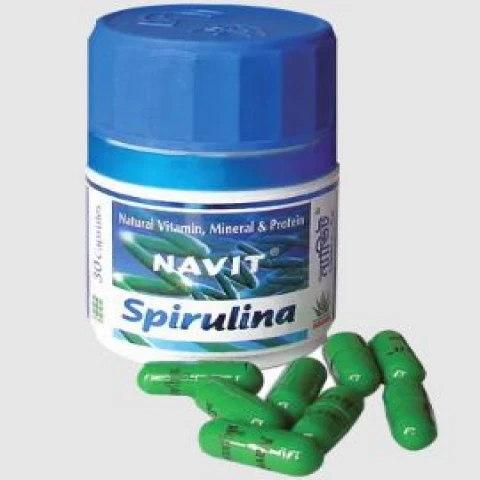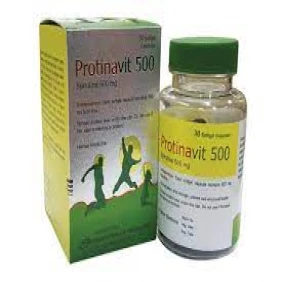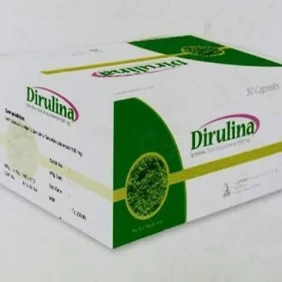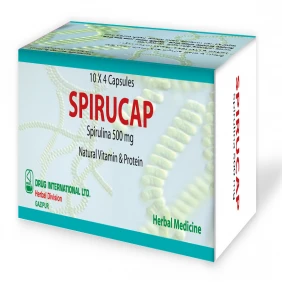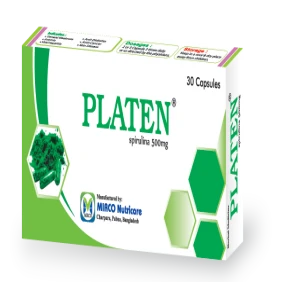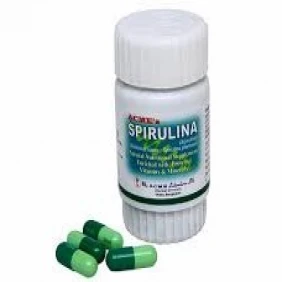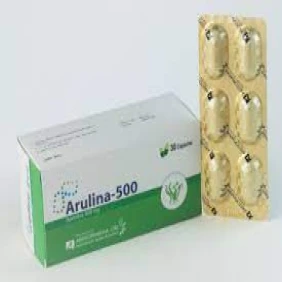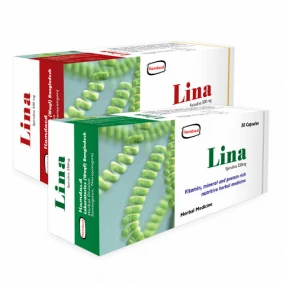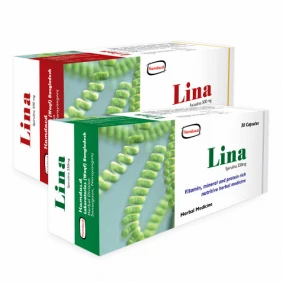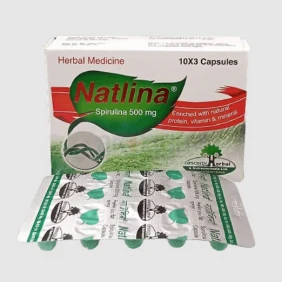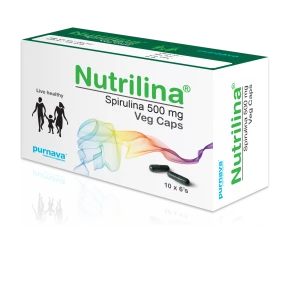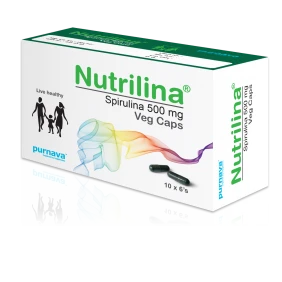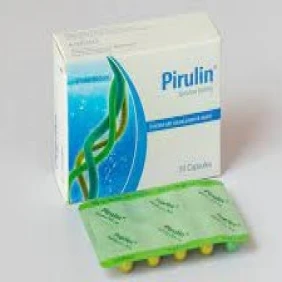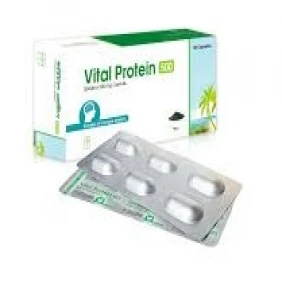Navit Capsule 30's pot
৳ 240
Order By Call:
+88 01540 384 786 (Mobile)
+88 01819 479 004 (WhatsApp)
Spirulina has shown some indication of having antiviral effects in preliminary in vitro and animal studies. There is also evidence of a preliminary nature that it might favorably affect some immune functions and have some hepatoprotective capability.
About the Product
Full Description
Indications
Spirulina has shown some indication of having antiviral effects in preliminary in vitro and animal studies. There is also evidence of a preliminary nature that it might favorably affect some immune functions and have some hepatoprotective capability.
Hypocholesterolemic effects have been reported in some animal studies. Animal and test tube studies suggest that spirulina increases production of antibodies, cytokines (infection fighting proteins), and other cells that improve immunity and help ward off infection and chronic illnesses such as cancer.
Spirulina promotes hematopoiesis (formation and development of red blood cells) and thus effective in anemia. This is thought to be due to the high levels of iron present in this food supplement. Animal and test tube studies suggest that spirulina may protect against allergic reactions by preventing the release of histamines and thus prevent allergy symptoms such as runny nose, watery eyes, hives, and soft tissue swelling. Spirulina helps to maintain healthy skin and treats several skin disorders, such as eczema and psoriasis. Spirulina is also contained in some skin care products due to its moisturizing and tightening properties, and components derived from spirulina may have properties to help reduce inflammation, for example, arthritis. Studies have determined that spirulina is an effective source of dietary vitamin A.
Spirulina can be used for general immune support and as an easily absorbed protein supplement in lack of appetite. It is also used in the treatment of Candida (yeast infections) and hypoglycemia (low blood sugar). Amino acids make up 62% of spirulina. Because it is a rich source of protein and other nutrients, spirulina has been used traditionally as a nutritional supplement by people who cannot obtain sufficient calories or protein through diet alone and by those whose nutritional requirements are higher than normal, such as athletes. Although antibiotics destroy unwanted organisms in the body, they may also kill "good" bacteria called probiotics (such as Lactobacillus acidophilus) which sometimes results in diarrhea. In test tubes, spirulina has promoted the growth of L. acidophilus and other probiotics. Test tube studies suggest that spirulina has activity against herpes, influenza, cytomeglovirus, and human immunodeficiency virus (HIV).
Therapeutic Class
Herbal and Nutraceuticals
Description
Spirulina is a genus of the phylum Cyanobacteria. Cyanobacteria are classified as either blue-green algae or as blue-green bacteria. Spirulina is a popular food supplement in Japan and is marketed as a nutritional supplement in the United States.
It has been consumed for thousands of years by Mexican (Aztecs, Mayans), African, and Asian peoples. There are several species of spirulina. The ones most commonly used in nutritional supplements are Spirulina platensis (also called Arthrospira platensis) and Spirulina maxima.
Spirulina is a rich source of protein. It also contains chlorophyll, carotenoids, minerals, gamma-linolenic acid (GLA) and some unique pigments. These pigments, called phycobilins, include phycocyanin and allophycocyanin. The pigments give spirulina their bluish tinge. Phycobilins are similar in structure to bile pigments such as bilirubin. In the spirulina cell, phycobilins are attached to proteins; the phycobilin-protein complex is called phycobiliprotein.
Spirulina is considered a complete protein, because half of it consists of amino acids. It is also a rich source of other nutrients including B complex vitamins, beta-carotene, vitamin E, carotenoids, manganese, zinc, copper, iron, selenium, and gamma linolenic acid (an essential fatty acid). The iron level in spirulina is equivalent to that contained in beef. Because of its apparent ability to stimulate the immune system, spirulina may have antiviral and anticancer effects. Test tube and animal studies suggest that spirulina may also help protect against harmful allergic reactions.
Pharmacology
A sulfated polysaccharide called calcium spirulan isolated from Spirulina platensis (Arthrospira platensis) was found to inhibit a number of membraned viruses. The viruses inhibited by the polysaccharide included herpes simplex virus 1 (HSV-1), cytomegalovirus, measles virus, mumps virus and HIV-1. Calcium spirulan appears to inhibit the penetration of these viruses into host cells. These studies were performed in vitro.
Spirulina has been shown to have hypocholesterolemic activity in experimental animals. The mechanism of this activity is unknown. The spirulina pigment phycocyanin has demonstrated antioxidant activity. It scavenges peroxyl radicals.
Phycocyanin has been found to protect against hepatotoxins in rats. The mechanism may be via its antioxidant activity. An extract of Spirulina also protected against carbon tetrachloride hepatotoxicity in rats. The phycocyanin contained in the extract, as well as other antioxidants, probably account for the hepatoprotective effect.
Mast-cell mediated immediate-type allergic reactions were found to be inhibited in rats by spirulina. It is speculated that there are substances in spirulina that may inhibit mast-cell degranulation, possibly by affecting the mast-cell membrane.
Spirulina platensis extracts have been demonstrated to enhance macrophage function in cats and to enhance humoral and cell mediated immune functions in chickens. The mechanism of these effects is unknown.
Dosage & Administration
Standard dosage of spirulina is 4 to 6 capsules (500 mg each) per day or as per the instruction of an appropriate health care provider.
Contraindications
Spirulina is contraindicated in those who are hypersensitive to any component of a Spirulina-containing supplement.
Side Effects
Occasional gastrointestinal symptoms, such as nausea, have been reported. Also, there are a few reports of allergic reactions to spirulina-containing supplements.
Precautions & Warnings
Before taking spirulina pregnant or breast-feeding women should talk to the physician.
Storage Conditions
Keep out of reach of the children. Keep away from direct sunlight; store in a cool and dry place.

